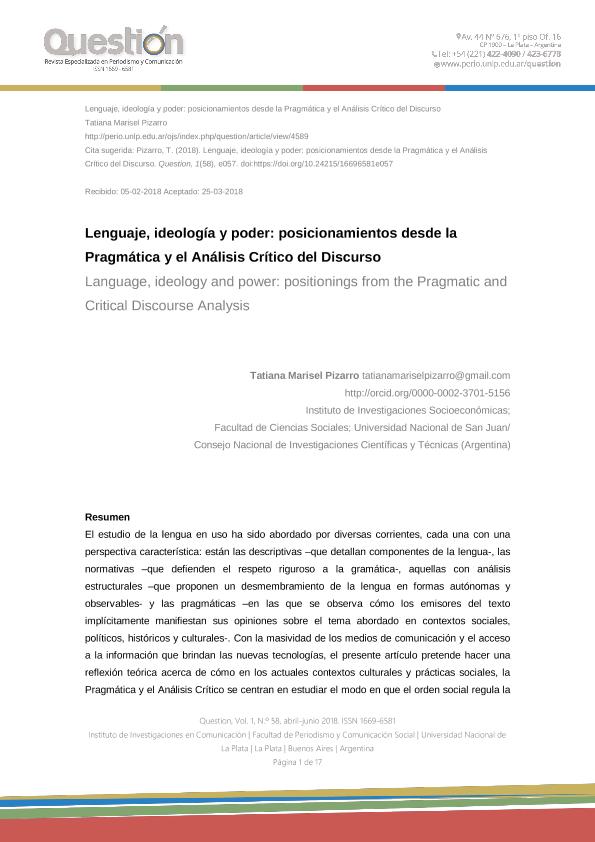Mostrar el registro sencillo del ítem
dc.contributor.author
Pizarro, Tatiana Marisel

dc.date.available
2022-05-02T19:48:41Z
dc.date.issued
2018-04
dc.identifier.citation
Pizarro, Tatiana Marisel; Lenguaje, ideología y poder: Posicionamientos desde la pragmática y el análisis crítico del discurso; Universidad Nacional de La Plata. Facultad de Periodismo y Comunicación Social. Instituto de Investigaciones en Comunicación; Question; 1; 58; 4-2018; 1-17
dc.identifier.issn
1669-6581
dc.identifier.uri
http://hdl.handle.net/11336/156273
dc.description.abstract
El estudio de la lengua en uso ha sido abordado por diversas corrientes, cada una con una perspectiva característica: están las descriptivas –que detallan componentes de la lengua-, las normativas –que defienden el respeto riguroso a la gramática-, aquellas con análisis estructurales –que proponen un desmembramiento de la lengua en formas autónomas y observables- y las pragmáticas –en las que se observa cómo los emisores del texto implícitamente manifiestan sus opiniones sobre el tema abordado en contextos sociales, políticos, históricos y culturales-. Con la masividad de los medios de comunicación y el acceso a la información que brindan las nuevas tecnologías, el presente artículo pretende hacer una reflexión teórica acerca de cómo en los actuales contextos culturales y prácticas sociales, la Pragmática y el Análisis Crítico se centran en estudiar el modo en que el orden social regula la producción de discursos, su circulación y valor desigual según el poder de los grupos dominantes, acciones que van más allá de tareas analíticas de corte semántico.
dc.description.abstract
The study of the language in use has been approached by diverse currents, each one by a singular perspective: there are the descriptive ones -which detail components of the language-, the regulations -which defend the rigorous respect to the grammar-, those with structural analysis -which propose a dismemberment of the language in autonomous and observable forms- and pragmatic ones -in which it is observed how the issuers of the text implicitly express their opinions about the topic approached in social, political, historical and cultural contexts-. With the mass media and the access to the information that there offer the new technologies, the present paper intends to make a theoretical reflection about how in the current cultural contexts and social practices, Pragmatics and Critical Discourse Analysis create links that allow us to analyze how the social order regulates the production of discourses, their circulation and unequal value according to the power of the dominant groups, actions that go beyond semantic analytic tasks.
dc.format
application/pdf
dc.language.iso
spa
dc.publisher
Universidad Nacional de La Plata. Facultad de Periodismo y Comunicación Social. Instituto de Investigaciones en Comunicación
dc.rights
info:eu-repo/semantics/openAccess
dc.rights.uri
https://creativecommons.org/licenses/by-nc-nd/2.5/ar/
dc.subject
PRAGMÁTICA
dc.subject
ANÁLISIS CRÍTICO DEL DISCURSO
dc.subject
DISCURSO
dc.subject.classification
Comunicación de Medios y Socio-cultural

dc.subject.classification
Comunicación y Medios

dc.subject.classification
CIENCIAS SOCIALES

dc.title
Lenguaje, ideología y poder: Posicionamientos desde la pragmática y el análisis crítico del discurso
dc.title
Language, ideology and power: Positionings from the pragmatic and critical discourse analysis
dc.type
info:eu-repo/semantics/article
dc.type
info:ar-repo/semantics/artículo
dc.type
info:eu-repo/semantics/publishedVersion
dc.date.updated
2022-05-02T16:34:02Z
dc.identifier.eissn
1669-6581
dc.journal.volume
1
dc.journal.number
58
dc.journal.pagination
1-17
dc.journal.pais
Argentina

dc.journal.ciudad
La Plata
dc.description.fil
Fil: Pizarro, Tatiana Marisel. Consejo Nacional de Investigaciones Científicas y Técnicas. Centro Científico Tecnológico Conicet - San Juan; Argentina. Universidad Nacional de San Juan. Facultad de Ciencias Sociales. Instituto de Investigaciones Socioeconómicas; Argentina
dc.journal.title
Question
dc.relation.alternativeid
info:eu-repo/semantics/altIdentifier/url/http://perio.unlp.edu.ar/ojs/index.php/question/article/view/4589
dc.relation.alternativeid
info:eu-repo/semantics/altIdentifier/doi/https://doi.org/10.24215/16696581e057
Archivos asociados
